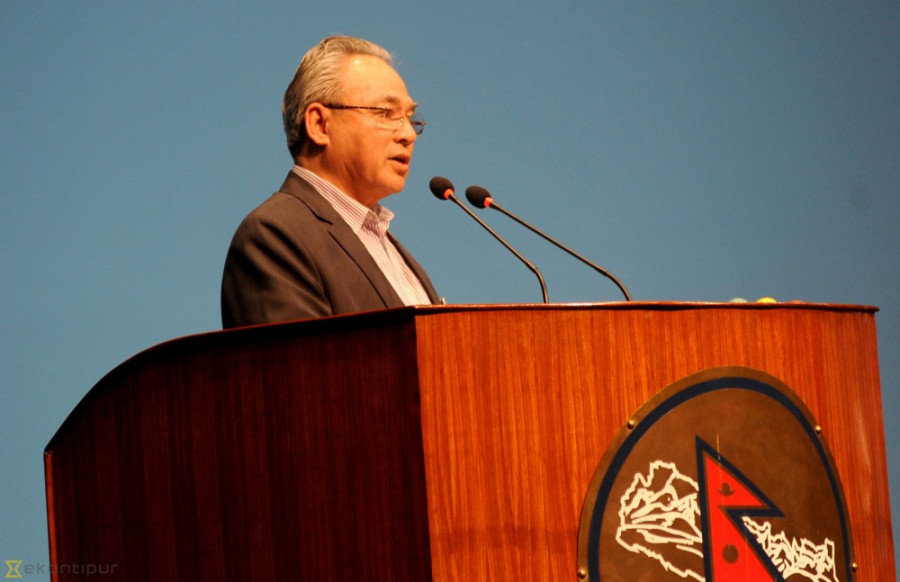Politics
Police killed a Madhesi man. Home minister blamed it on the man for standing on an elevated surface while police fired into the air.
Opposition obstructs House proceedings after ruling party refuses to form a panel to look into deaths of Kumar Paudel and Saroj Mahato.
Binod Ghimire
The ruling Nepal Communist Party’s refusal to form a parliamentary probe committee to investigate two incidents of deaths in Sarlahi district last month led to the obstruction of proceedings at the House of Representatives on Tuesday.
At the beginning of the House meeting, the primary opposition, Nepali Congress, and Rastriya Janata Party-Nepal demanded clarifications from Minister for Home Affairs Ram Bahadur Thapa over the deaths of Kumar Paudel, district chief of the Communist Party of Nepal led by Netra Bikram Chand, and Saroj Narayan Mahato, a Sarlahi resident.
Thapa, who has maintained a hard stance against the Chand-led party, reiterated that Paudel was killed in a police encounter. The government had banned the party’s activities in March.
Mahato died when police fired into the air, said Thapa.
The government has been facing criticism for the two deaths—both, however, occurred during different circumstances.
In Paudel’s case, lawmakers, including those from the ruling party, have accused the government of extrajudicial killing, saying police shot him dead after taking him into custody.
Mahato died when police opened fire on a group of villagers protesting against illegal sand mine operators. A minor from their village had died after falling into a sand pit.
Human rights activists have said that police largely fail to exercise restraint while dealing with protests and demonstrations in the Madhes, and resort to firing live ammunition even when the situation does not demand it.
On Tuesday, Thapa said that Paudel had first opened fire on security personnel and he was killed when police fired in retaliation.
“The incident took place while the police were performing their duty to maintain law and order,” said Thapa.
As far as Mahato’s death is concerned, “he died because he was standing on higher ground and when police fired in the air, the bullet hit him,” said Thapa.
Unconvinced by Thapa’s claims, lawmakers from the opposition demanded that a parliamentary team conduct objective reporting on both incidents.
“We don’t believe such baseless clarifications,” said Bal Krishna Khand, chief whip of the Congress party.
Opposition lawmakers stood from their seats, demanding a ruling from Speaker Krishna Bahadur Mahara to form a probe panel.
Mahara did not issue any ruling, but said that he was optimistic about consulting with parties to set up a House panel to investigate both incidents.
Opposition lawmakers, however, refused to budge and sought an immediate ruling, which led the Speaker to adjourn the House meeting for 15 minutes to reach an agreement.
The ruling Nepal Communist Party, however, said that there was no need for a parliamentary probe committee.
The House was then adjourned until Wednesday.
Khand of the Congress party told the Post that only an independent House committee can unearth the truth. The National Human Rights Commission has also said that Paudel’s death was suspicious.
The commission, which has completed a preliminary investigation into the incident, has directed the police to submit both postmortem and police reports by Thursday.
Police are reluctant to provide the reports to the national rights watchdog.
“Our preliminary investigation found the incident suspicious. We will come out with our final findings after studying the technical reports from the police,” Bed Bhattarai, secretary of the Commission, told the Post. According to Bhattarai, the government's explanation that Paudel was killed in a police encounter doesn’t hold water.
Bhattarai said the Commission is also investigating Mahato’s death.
“We are probing whether such stern measures were necessary to contain demonstrations that day,” said Bhattarai.
Mahato, from Ishwarpur Municipality, was killed on June 30 after police opened fire on demonstrators. The government and police have both claimed that Mahato died from a shot fired into the air.
Various human rights reports have suggested that security forces resort to excessive force when it comes to the people from the Tarai. In 2015, during the month-long demonstration against the constitution, more than 40 people were killed in violent protests—15 protesters were shot dead by the police, according to Human Rights Watch. A recent report by Advocacy Forum Nepal showed that people from the Tarai’s ethnic community are more prone to torture in detention centres than those from other communities.
Rights activists have long been raising concerns over the government’s hard-handed approach to maintaining law and order and dealing with demonstrations and protests.
Thapa, once a long-time ally of Chand, appears willing to take stern measures to contain the activities of the Communist Party of Nepal, a Maoist offshoot that aims to launch a “unified revolution”.
While the government has said it is open to talks, over the months, it has arrested hundreds of Chand party cadres.
The government banned the activities of the Chand party in March after two bomb blasts in the Capital killed one person and injured two others.
Again, in May, at least four Chand cadres were killed when cooking gas cylinders they were trying to rig as explosives went off accidentally. While informing the House of the blasts, Thapa had said that those killed were not citizens, but Chand’s cadres.
“The government reports [on the two incidents of death] are not reliable,” Khand told the Post. “We fail to understand why the ruling party is reluctant to form a parliamentary probe committee.”




 8.67°C Kathmandu
8.67°C Kathmandu














